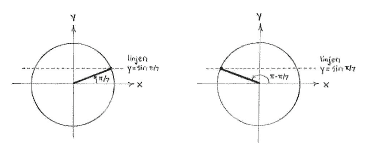Solution 4.3:1b
From Förberedande kurs i matematik 1
(Difference between revisions)
(Ny sida: {{NAVCONTENT_START}} <center> Bild:4_3_1b.gif </center> {{NAVCONTENT_STOP}}) |
m |
||
| (5 intermediate revisions not shown.) | |||
| Line 1: | Line 1: | ||
| - | + | Because the sine value for an angle is equal to the angle's ''y''-coordinate on the unit circle, two angles have the same sine value only if they have the same ''y''-coordinate. Therefore, if we draw in the angle <math>\pi/7</math> on a unit circle, we see that the only angle between <math>\pi/2</math> and <math>\pi</math> which has the same sine value lies in the second quadrant, where the line <math>y = \sin (\pi/7)</math> cuts the unit circle. | |
| - | < | + | |
| - | + | [[Image:4_3_1_b.gif||center]] | |
| + | |||
| + | Because of symmetry, we have that this angle is the reflection of the angle <math>\pi/7</math> in the ''y''-axis, i.e. <math>v = \pi - \pi/7 = 6\pi/7\,</math>. | ||
Current revision
Because the sine value for an angle is equal to the angle's y-coordinate on the unit circle, two angles have the same sine value only if they have the same y-coordinate. Therefore, if we draw in the angle \displaystyle \pi/7 on a unit circle, we see that the only angle between \displaystyle \pi/2 and \displaystyle \pi which has the same sine value lies in the second quadrant, where the line \displaystyle y = \sin (\pi/7) cuts the unit circle.
Because of symmetry, we have that this angle is the reflection of the angle \displaystyle \pi/7 in the y-axis, i.e. \displaystyle v = \pi - \pi/7 = 6\pi/7\,.

